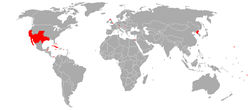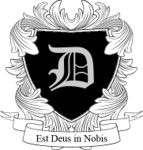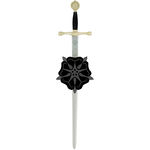Empire of D'visa
Empire of D'visa | |
|---|---|
| Motto: Est Deus in Nobis (English: There is a God inside Us) | |
| Anthem: Ouverture of 1812 | |
 D'visan claims are in red (Antarctic claims not pictured) | |
| Capital | Imperial Court |
| Largest city | Houston |
| Official languages | Imperial English, Spanish, Gaelic, German, Hungarian, Samoan, Korean, and Latin |
| Demonym(s) | D'visan |
| Government | Absolute monarchy |
• Sovereign | HIM Michael, Emperor of D'visa |
• Imperial Chancellor | HG Nicholas, Archduke of Richmond |
• Protector of the Realm | the Sovereign* |
| Legislature | Imperial Parliament |
| Establishment | June 26th, 2011 |
| Population | |
• Census | aprox. MATH IS HARD |
| Currency | Imperial Mark (ℳ) divisible into 100 Simoleons (Ψ) (the Mark is pegged in value to U.S. Dollar at a ratio of 1:1) |
| Time zone | (UTC-11, -8, -7, -6, ±0, +1, +9, and +12) |
*The title "Protector of the Realm" is held by the Sovereign as a courtesy title, except during a Regency, when it is held by the Imperial Chancellor. | |
The Empire of D'visa (pronounced [d'vɪsæ]) is a micronation and absolute monarchy in North America with several Colonial territories located on other continents, as well as on islands in the Pacific and Atlantic oceans. Provencal D'visa extends from the northern coast of the Gulf of Mexico through the Colorado Rockies and Mojave Desert to the California Coast of North America. It is bordered by the United States in the north and by Mexico in the south. In addition to these borders on the North American continent, the Empire has land borders with the United Kingdom through Glenfinnan, Tulloch and Richmond, Panama through Panama territory, New Zealand and Chile through Marie Byrd Land, Egypt through Suez, Germany through Neuschwanstein, Hungary through Buda, and with South Korea, China, and Russia thorugh the North Korean Military District. In July 2011, His Imperial Majesty extended diplomatic relations to the United Nations.
History
The Empire's History can be traced to The Stoop, an organization established by miscreants Dan McLeod, Dietrich Wertz, Ryan McCarty and Jenifer Boullé at a Dallas high school. One of it's members, Michael Davis, a descendant of ancient European nobility, was appointed President by his predecessor, Philip Villalobos. Immediately, he assumed the title Emperor of the Stoop, and enacted a series of reforms. Another member, Pope Nicholas Campagna, turned reactionary and attempted a coup d'état. After a short civil war, The Stoop adopted a counsel government, by which the five Officers would govern together. This system lasted until 2011, when Connor Riley, the last Officer of the Stoop, graduated and ascended to the position of an Outer King, effectively ending the organization. Davis went on to found the now defunct cyber-nations of Terra_V (a democratic-republic) and Masseern (a totalitarian socialist dictatorship). In 2009, Davis was made a Barron of Sealand. In 2011, after receiving a ticket for speeding, Davis (now Emperor Michael) issued Imperial Edict No. 1, founding the Empire of D'visa, and began forming an aristocratic government.
Government and Administration
The Empire is an absolute monarchy ruled by HIM Emperor Michael of D'visa. Although technically the entire Empire is the personal property of the Sovereign, his authority has been devolved into a three branch State government, consisting of an executive Imperial Cabinet, a legislative Imperial Parliament, and a judicial Imperial High Court, as well as several Provencal and Colonial administrations and elected Municipal governments.
Imperial Cabinet
the Imperial Cabinet is an advisory and administrative counsel of the seven Great Officers of State, directly appointed by the Sovereign. As of September 1, 2012 they are:
-
Imperial Chancellor
HG Lord Nicholas, Archduke of D'visa KBR -
Eternal Imperial Foreign Minister
HH Prince James, Archduke of D'visa KCBR -
Imperial Treasurer
HH Princess Jane, Archduchess of D'visa KBR -
Imperial Marshal
HG Lord John, Archduke of D'visa KCBR -
Civil Administrator
Minister of Happy Times and Smiles
HG Lord Zach, Count of Glenfinnan KBR -
Colonial Administrator
HG Lord Connor, Count of D'visa KBR -
Labor Minister
HG Lord Dylan, Viscount of D'visa KBR -
Commerce Minister
HG Lord Curtis, Baron of D'visa KBR -
Agriculture Minister
HG Lord Brian, Count of D'visa KBR -
High Interrogator
HG Lord Ricker, Viceroy of California KBR -
Master of Revels
HG Lord Eric, Warden of the North KBR
During a regency (ie. the Sovereign is not yet of age to rule or otherwise incapacitated), the normally courtesy title of Protector of the Realm is transferred to the Imperial Chancellor, who Rules in the Sovereign's Name until the legitimate Sovereign can rule, and member of the Imperial Family is selected as Regent for ceremonial and state occasions.
Imperial Parliament
The Sovereign may call a unicameral assembly of the Empire's Nobility, and representatives elected from each Provence and Colony, to advise the Sovereign on matters He or She requests, as well as any other recommendations they elect to. The Sovereign may or may not decide to pass an Imperial Edict on these issues. The Sovereign has called an Imperial Parliament to assemble on August 23, 2013.
Imperial Judicial Courts
The Sovereign is The ultimate legal authority in the realm. Actual management of the judiciary falls to the seven member Imperial High Court, which are headed by the Imperial High Justice. Other Courts and jurisdictions are established by the Imperial High Court in the Sovereign's Name.
Provencal and Colonial Administrations
The Civil Administrator is charged with managing the Provencal government. Each Provence has several appointed Judges, a Sheriff, a Provencal Attorney, and a Providential Comptroller, as well as one or more elected Municipal Governments. The Provence's citizenry may elect a representative to an Imperial Parliament when called to assemble. Each Provence and Municipality is administratively subdivided into Civil Districts and Precincts. Territory utilized by the State government is not part of any Provence. The Colonial Administrator is charged with managing the former territory of the Stoop, as well as the Empire's colonies of Samoa, Wake Island, Suez, Panama, Nassau, Glenfinnan, Tulloch, Richmond, Neuschwanstein, Buda, and Marie Byrd Land. The North Korean Unified Military District, a Colonial territory, is under the administration of the Commander of the Unified Military District of North Korea. Colonies are granted a great deal of autonomy, though they are still ultimately accountable to the State government and the Sovereign.
Law
D'visan law is a Civil Law system. All persons in D'visa (apart from diplomats and the Sovereign Himself) are subject to the Sovereign's Law. The State is not required to provide a jury, nor a counsel for the defendant, but generally does both. Some important legal concepts to note are:
- the Sovereign is the Autocrat, and thus God's chosen leader of the realm. He or She is the ultimate authority in all matters: Legal, Political, Military, etc.
- the Protector of the Realm is the office holding the temporal power behind the Crown. It is through this office that the Sovereign operates the government, military, and the courts.
- the Sovereign's Law is the official name of the body of Imperial Edicts which form the backbone of the Empire's civil law.
- the Sovereign's Name, also called the Crown or the Throne, is the authority by which the Sovereign's agents operate.
There are five classes of crimes: Treasonous, Capital, Felonious, Misdemeanor and Procedural. Treasonous crimes are committed against the Sovereign and/or State, and includes the murder of State officials, as well as Nazisim. These crimes generally carry the death sentence, although life imprisonment is an option. Capital Crimes include murder of Commoners, and may be punishable by death or extremely long prison sentences. Felonies are a broad scope of serious crimes, and carry the penalty of long term imprisonment. Misdemeanors are less serious, and may be punished by short jail sentences, required community service, or fines. Procedural crimes are the least serious, and are universally punished by fines or required community service.
Foreign relations
The Empire recognizes the sovereignty of all U.N. member states (except the North Korea, Samoa, Jamaica, Beliz, Cuba, nor any other State's territorial clams to Imperial territory), as well as Tibet, the Vatican, the Republic of Kosovo, Palestine, the Republic of China (Taiwan), the Principality of Sealand, Christiania, The Tsardom of Monovia, the Republic of Molossia, Ladonia, the Kingdom of Lovely, the Conch Republic, the Principality of Hutt River, the Republic of Minerva, the Zapatistas, the Independent Nation of John-Greensylvania, the Confederation of Leylandiistan & Gurvata and the Sovereign Military Order of Malta. The Sovereign has agreed, in principle, to the Geneva Conventions, the UN Charter, the Antarctic Treaty System, the Vienna Conventions, the Outer Space Treaty, the Law of the Sea, the Luna Treaty, the Nuclear Non-Proliferation Treaty, the Patent Cooperation Treaty, Seabed Arms Control Treaty, Biological Weapons Convention, the Montreal Protocol, the Kyoto Protocol, the Rome Statute, and the Universal Declaration of Human Rights. The Empire has applied for U.N. membership.
Military

The Empire's Military is under the ultimate authority of the Sovereign and administratively commanded by the Imperial High Command, which is managed by the Imperial Marshal. The High Command is comprised of three parts: three Branch Commanders (Army Chief, Navy Chief, and Air Force Chief), ten Unified Military District Commanders (Texas, Mojave, Colorado, California, Colonial, and North Korean), and five Joint Commanders (Special Operations Command, Strategic Command, Transportation Command, the Office of Military Intelligence, and Facility & Standards Control).
Militarized Police
In addition, the Empire has four branches of militarized police forces: Civil Guards, charged with normal police duties, are under the command of Provincial Sheriffs. Border and Coastal Guards are under the command of the Imperial Marshal. Imperial Guards are charged with State Security and guarding the Imperial Family.
State and Imperial Emblems
Flags
-
State Flag
For use by the State and Nation. Also used as a War Flag and Naval Ensign -
Imperial Flag
For personal use by the Sovereign
Seals
-
Great Seal of State
For use by the Imperial Government -
Imperial Seal
For use by the Sovereign and as a National Seal
Badges
-
Imperial Monogram
For use in the Sovereign's Name -
Badge of the Knight-Commander
For use by Knight-Commander of the Order of the Black Rose -
Badge of the Order of the Black Rose
For use by Members of the Order of the Black Rose
Social Ranks
The Nation is divided into two classes of citizenry: the Commons and the Nobles. Slavery and Serfdom are currently illegal in D'visa. Commons are legal permanent residents of the Empire, while Nobles are individuals who the Emperor has invested with a Title of Nobility. These Titles give their bearers an automatic seat in any Imperial Parliament, make them eligible for Great Office of State, the ability to sit as a Judge on the Imperial High Court, is a prerequisite to be promoted to a Flag Officer rank in the military, as well as gives them the the right to bear Heraldry. The Styles and Ranks of the Nobility are:
- His or Her Imperial Majesty, The Emperor or Empress
- His or Her Grace, The Lord Archduke or Lady Archduchess
- His or Her Grace, The Lord Duke or Lady Duchess
- His or Her Grace, The Lord Count or Lady Countess
- His or Her Grace, The Lord Viscount or Lady Viscountess
- His or Her Grace, The Lord Barron or Lady Baroness
- Sir or Lady Knight of the Black Rose
Members of the Imperial Family may use the Style of His or Her Highness, Prince or Princess in place of Lord or Lady. The Style of His or Her Majesty, Imperial Prince or Imperial Princess is reserved for the Sovereign's children. The Heir or Heiress Apparent is styled as His or Her Royal Majesty, the Crown Prince or Crown Princess.
Order of the Black Rose
There is also a Chivalric Order of the Black Rose, ceremonially lead by the Knight-Commander (KCBR) in the Sovereign's Name, who's members are comprised of all the Nobility and members of the Military and Police forces. They are entitled to the Rank of Knight (KBR).
National Holidays
| Date | Name of Holiday |
|---|---|
| January 1 | New Year's Day |
| January 17 | the Rev. Dr. Martin Luther King Jr's Birthday |
| March 15 | The Emperor's Birthday |
| March 20 | Spring Equinox |
| May 1 | May Day |
| June 21 | Summer Solstice |
| June 26 | Imperial Independence Day |
| August 25 | Feast Day of St. Genesius of Rome |
| September 23 | Autumnal Equinox |
| October 2 | Mohandas Karamchand Gandhi's Birthday |
| October 31 | Halloween |
| December 22 | Winter Solstice |
| December 25 | Christmas Day |
| December 31 | New Years' Eve |



















